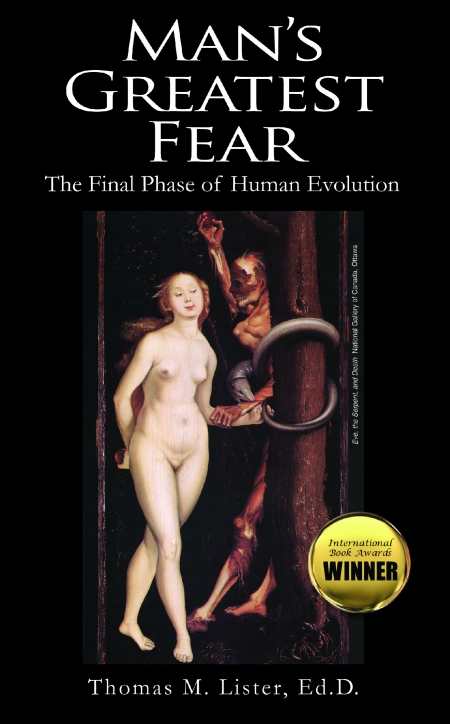It looks like you've stumbled upon a page meant to be read by our code instead of viewed directly. You're probably looking for this page.
Man's Greatest Fear
The Final Phase of Human Evolution (Second Edition)
What does man fear most? What insecurities lead him to pursue, conquer, and destroy other men, new territories, and even his own environment? Thomas M. Lister believes that one force lies beneath many of man’s most destructive activities: fear of women. In Man’s Greatest Fear, Lister uses Freudian psychoanalytic theory to explain how men react to the natural life-giving power of women and what that means for the world.
Sigmund Freud has been criticized for disparaging women, minimizing their complaints with labels like “hysteria” and “penis envy.” Lister, a student of psychoanalytic theory since his years serving as a medic in the Vietnam War, turns Freud’s characterization inside out. In Lister’s estimation, it is instead men who suffer from a form of womb envy, borne of the knowledge that “Woman, with very little input from man (one sperm) is the personification of God on earth.”
Faced with women’s awe-inspiring ability to create life, Lister suggests, men feel insignificant. Men also find themselves overpowered by their sexual attraction to women. The combination, posits Lister, induces men to subjugate women and live lives of glory on the battlefield, or in the boardroom, to prove their own worth.
Lister’s historical knowledge is vast, and he supplies examples from a variety of eras and cultures to support his argument. He speaks with authority on everything from early man’s biological imperative to control and conquer his environment to modern man’s global territorial battles, our world wars. This second edition of Man’s Greatest Fear brings the examples up-to-date, including the wars in Iraq and Afghanistan, as well as man’s apparent war against the environment.
In some chapters, Lister’s ticker tape of man’s mistakes steals the spotlight, momentarily losing the thread of his Freudian analysis and taking on the tone of a political opinion piece. For instance, in the chapter on leadership, Lister expounds upon the growing income disparity in the United States, the “PAC-rigged” political system, and the “hypocrisy of the Republican elite.” He offers his observations as proof of corruption in a male-dominated leadership structure, but they might be more effective if less politically biased.
Addressing the changes needed in the future, Lister repeatedly quotes Albert Einstein’s statement that it “will take a whole new manner of thinking for mankind to survive.” To that end, he offers a 28-point plan aimed at changing the political landscape from a male to a female perspective. This includes scenarios like electing a female president, protecting women’s reproductive rights, and shifting to sustainable energy sources.
Well-documented, thorough, and provocative, Man’s Greatest Fear suggests that we look carefully at the way our society treats men and women. Much like an individual might uncover repressed memories on the psychologist’s couch, society can become aware of its essential conflicts. By making the subconscious conscious, on a global scale, Lister suggests we can heal the world.
Reviewed by
Sheila M. Trask
Disclosure: This article is not an endorsement, but a review. The publisher of this book provided free copies of the book and paid a small fee to have their book reviewed by a professional reviewer. Foreword Reviews and Clarion Reviews make no guarantee that the publisher will receive a positive review. Foreword Magazine, Inc. is disclosing this in accordance with the Federal Trade Commission’s 16 CFR, Part 255.
